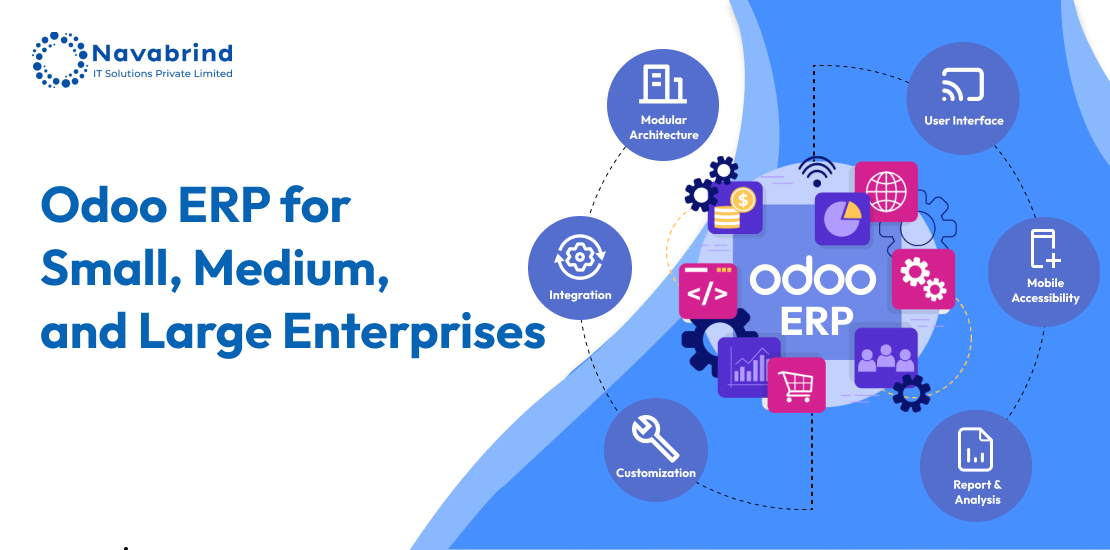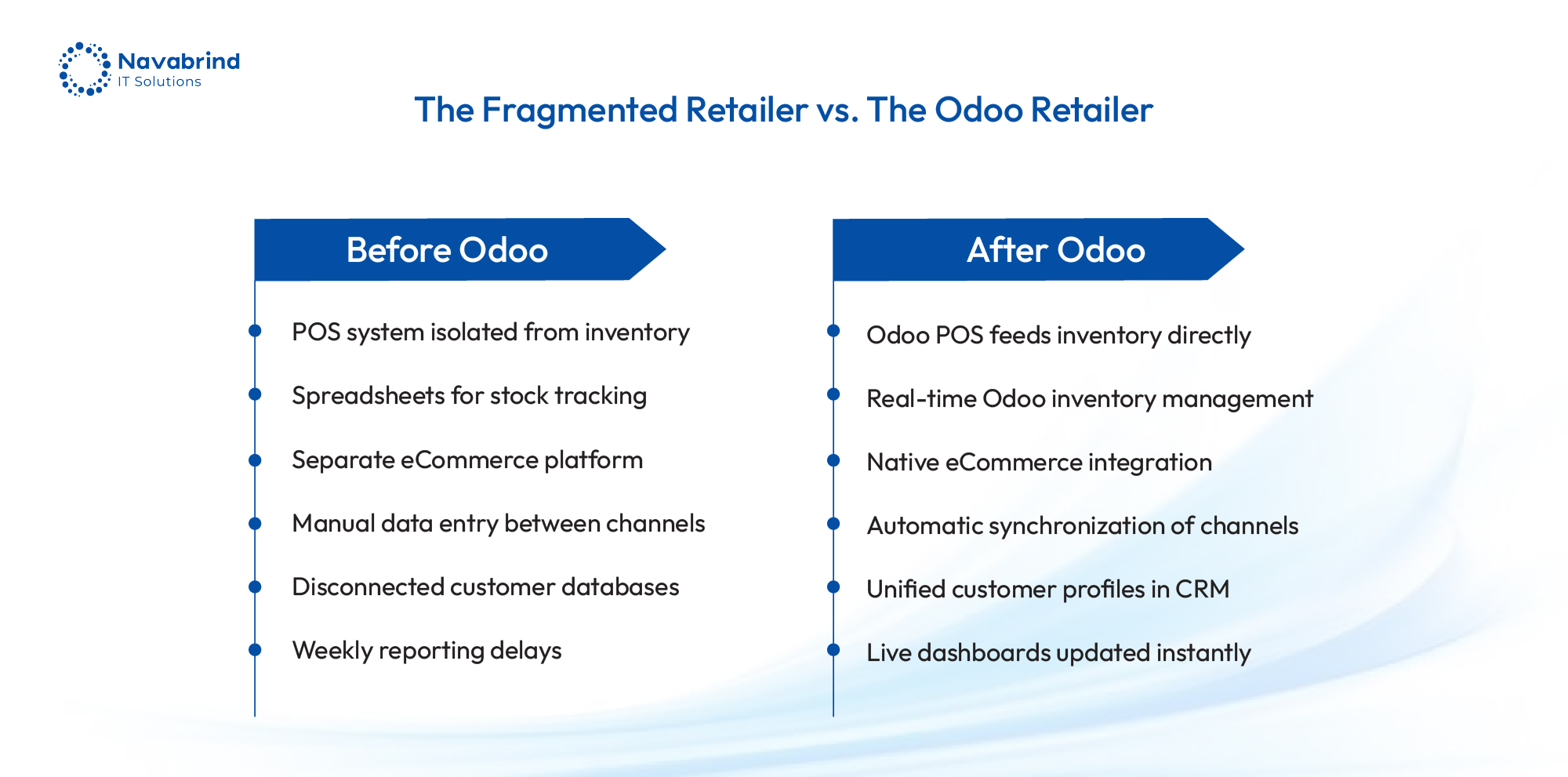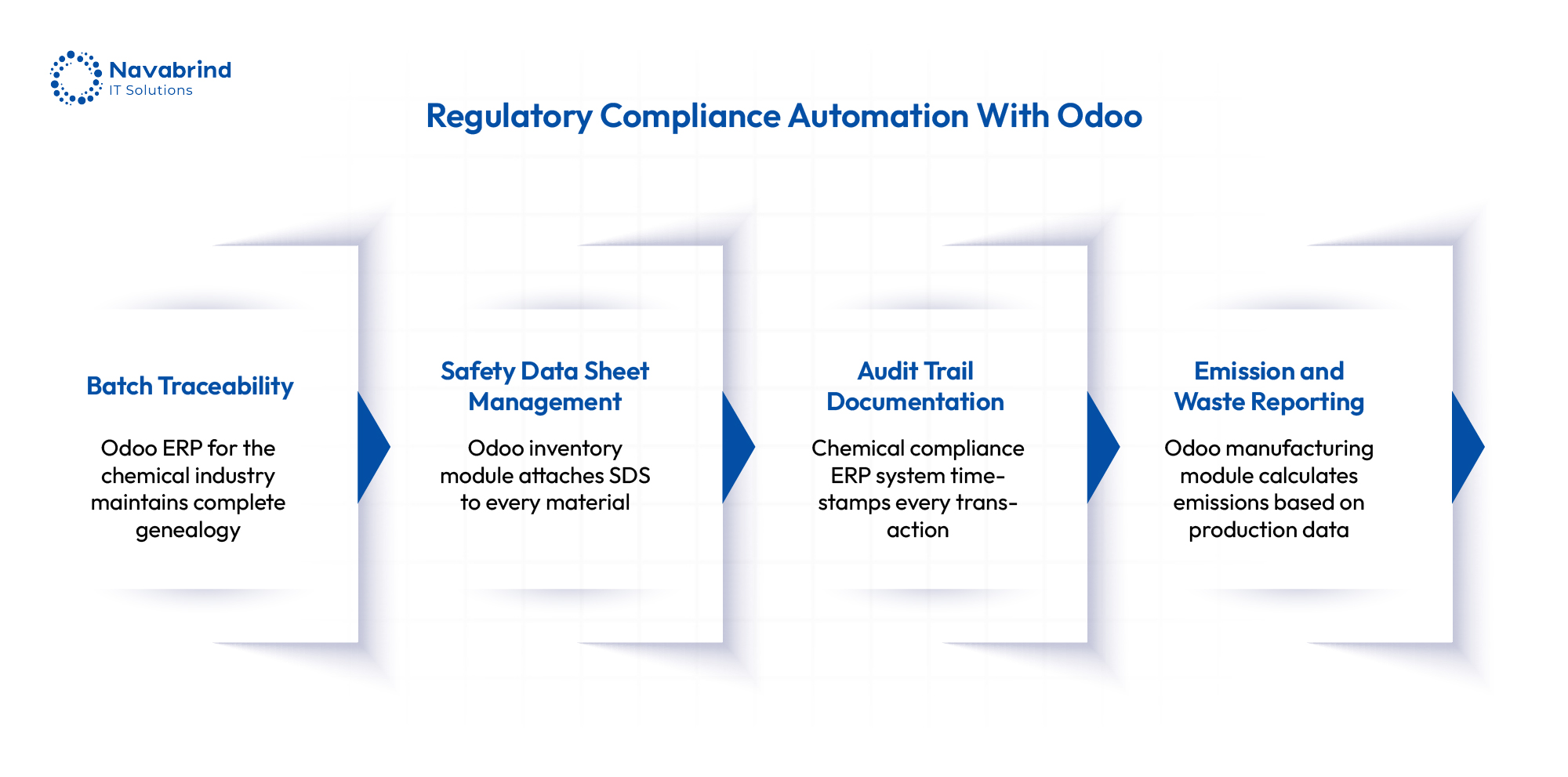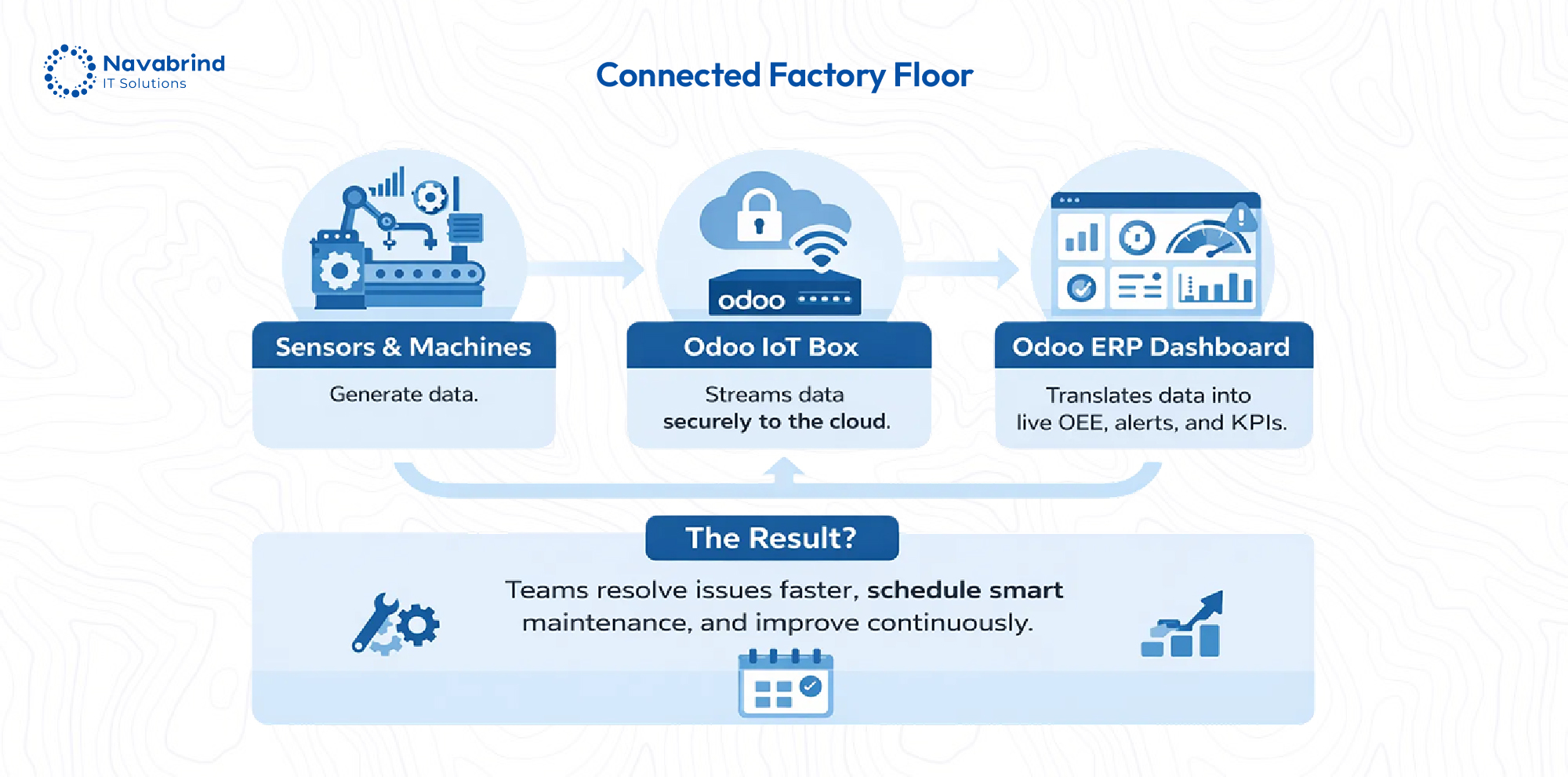Odoo ERP: Best ERP Software for Small and Medium Enterprises (SMEs)
- October 30, 2024
- Posted by: Tony
- Categories: Blog, Odoo

Though the opportunities for small and medium enterprises (SMEs) continue to expand, they also need to address unique business challenges that come their way. These challenges include limited access to financial resources, retaining and training employees, ensuring internal tech solutions keep pace with business, quickly pivoting to changing customer demand, and adopting technology that meets the leadership’s need for insights and intelligence.
The tech requirements of SMEs are long, and only some ERPs fit the bill, as well as Odoo ERP does. An affordable, scalable, and flexible solution, Odoo ERP modules integrate critical business functions such as sales, accounting, manufacturing, inventory, marketing, sales, CRM, and more into one unified platform.
Odoo ERP for SMEs has a ‘building block’ approach that prevents the common pitfalls of large-scale ERP implementations, such as high costs and long deployment times, while ensuring that the solution grows with them.
On their digital transformation journey, Odoo ERP for SMEs automates many processes and integrates with thousands of apps specific to their industry and requirements. With robust Odoo ERP analytics and reporting tools, SMEs can make informed decisions and enhance their ability to compete in a dynamic market. This open-source ERP system ensures that it remains customizable and adaptable to the needs of different industries. It is also the best ERP software for SMEs looking to embrace digital transformation and future-proof their operations.
Odoo, the Best ERP for Small Businesses
Odoo’s modular structure makes it the best ERP software for small businesses, including startups.
- Low Barrier to Entry: Startups can begin with the Odoo ERP implementation of just one or two modules and with minimal upfront investment. Businesses can choose between the free Community version or the pay-as-you-go Enterprise version.
- Simplified Implementation: Traditional ERP systems involve complex, large-scale implementations that can overwhelm small companies. Odoo’s modular approach enables small businesses to adopt the necessary modules and go live with minimal disruption.
- Scalability for Growth: As startups and small companies grow, Odoo allows them to add modules without overhauling their entire system.
Here’s an example of a Navabrind IT Solutions client, a small e-commerce retailer who started with the Odoo CRM and Sales modules to manage customer orders and track sales leads. When our client decided to expand to other European countries, they added the Inventory module to streamline stock management and the Accounting module. The client added multi-currency and new e-commerce features without disrupting their existing operations.
Odoo ERP Implementation for Medium-Sized Businesses
Though Odoo ERP is recognized as the best ERP software for small businesses, medium-size businesses have successfully harnessed Odoo to manage extensive inventories, expand sales channels, and improve customer relationships.
- Integration: A company initially implementing Odoo’s CRM module can later add the marketing module to improve customer engagement.
- Adaptable to Expanding Operations: As operations become complex, Odoo enables enterprises to add functionalities, such as multi-warehouse management, with ease.
- Process Optimization: As they grow, medium-sized businesses could face inefficiencies in inventory management or order processing. Odoo’s open-source ERP system allows companies to use inventory management and later adopt advanced manufacturing and supply chain modules to handle increased demand.
On the digital transformation journey with Odoo ERP, a mid-sized manufacturing company and Navabrind IT Solutions client, initially implemented Manufacturing and Inventory modules to improve production efficiency. As they expanded, they integrated with third-party modules such as Advanced Product Quality Planning (APQP) and Production Part Approval Process (PPAP) to better manage and monitor production at several manufacturing plants. Over time, the client added advanced analytics to gain deeper insights into operational performance.
Deep Business Process Automation with Odoo ERP for Large Enterprises
Large enterprises typically require extensive functionalities across multiple departments, from financial management and human resources to supply chain and manufacturing operations. Odoo ERP modules enable the management of large multinational operations.
- Enterprise-Grade Solutions: Odoo ERP implementation offers modules to meet the needs of large businesses, such as project management, fleet management, dashboard, and even integration with IoT (Internet of Things), product information management, MDM, etc.
- Odoo ERP Customization: Odoo’s open-source ERP system allows for extensive customization, ensuring that businesses can adapt the software to fit their needs.
- Multi-Company and Multi-Language Support: Odoo is designed to handle multinational operations and offers multi-company and multi-language support.
- Data Integration and Unified Reporting: Large organizations often struggle with data silos that hinder decision-making and operational efficiency. Odoo ERP modules integrate data across departments, enabling real-time reporting and analytics.

A Navabrind IT Solution client and a large food grain seller and aggregator implemented Odoo’s Purchase and Inventory modules to manage their expansive sales and distributor network. As their business scaled, they integrated additional modules such as multi-warehouse management. The company also leveraged Odoo’s financial reporting tools to consolidate data from its national operations, providing real-time insights across multiple regions.
Odoo ERP Scalability: Adopting New Odoo ERP Modules as Needs Change
With Odoo ERP for SMEs, businesses aren’t locked into a set number of features or functionalities—they can select and add from thousands of integrations, remove modules when not necessary, or customize modules as needs change.
- Odoo ERP Industry-Specific Customization: Odoo’s marketplace offers various industry-specific modules and third-party apps, such as Slack, Asana, Zendesk, Shopify, SAP, Tableau, and others. Odoo users can also adopt specialized integration for manufacturing such as Advanced Product Quality Planning (APQP), Production Part Approval Process (PPAP), Failure Mode and Effects Analysis (FMEA), Material Requirements Planning (MRP), Corrective and Preventive Actions (CAPA), Shop Floor Control (SFC).
- Future-Proofing with Odoo: As technology evolves, Odoo ERP modules are continuously updated to incorporate new features and best practices. For instance, Odoo 18, released in the latter half of 2024, has AI in several modules. This enables businesses to stay competitive without needing to switch platforms.
Implementing Odoo ERP: Does it Deliver ROI for SMEs?
The financial benefits of Odoo open-source ERP system are apparent when an SME consolidates its operations into a single system. Here’s how Odoo delivers financial savings:

1. Lower Software Licensing and Subscription Fees
Most businesses run multiple tools to manage various departments, each with a licensing or subscription cost. Odoo helps SMEs integrate with one single, modular platform. A mid-sized company using separate software for CRM, project management, and inventory could be spending thousands per year on licensing alone. With Odoo ERP implementation, a company cuts these costs by paying for a single solution, potentially saving up to 60% in software-related expenses.
2. Reduced IT Overhead
When a company needs to manage multiple software systems, it requires a dedicated IT team to handle maintenance, updates, troubleshooting, and integrations. Odoo ERP integration reduces the burden on IT staff by offering a unified solution that simplifies system management. With fewer tools to monitor, IT teams can mitigate routine software maintenance and focus on strategic initiatives instead.
Businesses often need to pay for custom integrations to ensure these systems work together using multiple tools. Odoo’s native integrations eliminate the need for custom development.
3. Lower Training Costs
With Odoo’s open-source ERP system, businesses only need to train staff on one platform, reducing onboarding time and costs. This is beneficial for growing companies where new hires need to adapt to company systems. Odoo’s consistent user experience across modules makes it easier for employees to navigate different functionalities without extensive training.
How Odoo ERP Implementation Enhances Efficiency for SMEs
Odoo ERP modules drive significant productivity gains for SMEs by streamlining workflows, reducing errors, and improving team collaboration.

- Automation of Repetitive Tasks – Odoo automates time-consuming tasks, such as generating invoices, updating inventory, and sending out customer follow-ups. By eliminating manual data entry, businesses can free up time for employees to focus on strategic tasks.
For example, Odoo ERP features automatically track inventory levels and send notifications when stock runs low. This reduces the risk of stockouts and allows businesses to manage their supply chains without constant manual oversight. - Improved Decision-Making with Real-Time Data – An advantage of Odoo ERP implementation is the access to real-time data across business functions. Whether it is sales, finance, or operations, decision-makers have immediate access to up-to-date information. A sales manager can view real-time sales data alongside inventory availability to decide pricing or promotions. Similarly, finance can monitor cash flow, receivables, and payables in real-time, allowing them to adjust budgets and respond quickly to financial discrepancies.
- Streamlined Collaboration Across Departments – In organizations with multiple software systems, interdepartmental communication is stifled. Odoo’s integrated platform fosters collaboration by giving teams real-time access to the same information. Sales teams can work alongside finance, and HR can collaborate with operations.
Odoo ERP features, such as the Project management tool, provides a central hub for teams to communicate, share updates, and track project milestones, reducing miscommunication and improving collaboration.
For Digital Transformation with Odoo ERP, a CRM is a crucial module to help SMEs retain, engage, and grow their customer base. Odoo’s open-source ERP system, with its integrated Customer Relationship Management (CRM) module, offers a solution for managing customer interactions. Integrating Odoo’s CRM with other operations enables a data flow, and builds long-term customer loyalty.
Unlike standalone CRM tools, Odoo’s CRM is part of an all-in-one platform that connects various departments, enabling businesses to respond dynamically to customer needs.
1. Tracking the Complete Customer Journey
Understanding the customer journey is essential for delivering personalized and responsive service. Odoo’s CRM module provides a 360-degree view of the customer’s interactions with the business, whether tracking leads from initial contact through the sales pipeline or monitoring post-sales service interactions. The unified approach powered by Odoo’s CRM module helps businesses to:
- Map Customer Touchpoints: From website visits and social media engagement to sales inquiries and support tickets.
- Tailor Responses Based on Behavior: With detailed customer profiles, businesses can offer personalized services, increasing the likelihood of conversions and long-term loyalty.

2. Integration with Sales, Inventory, and Marketing for Better Customer Service
Odoo ERP integration with CRM, sales, inventory, and marketing modules, ensures teams work with the same real-time data. This cross-functional integration allows SMEs to deliver fast customer service.
- Sales and CRM Synergy: Odoo ERP modules, such as CRM and sales, work in tandem to provide sales with real-time status on leads, ongoing deals, and customer preferences. This integration allows sales to offer personalized deals, negotiate better terms, and close sales faster.
- Inventory and CRM Integration: When the CRM is integrated with the inventory system, sales reps can provide customers with accurate delivery timelines, real-time stock levels, and product availability.
- Marketing and CRM Collaboration: Marketing teams can leverage CRM data to create targeted campaigns based on customer behaviors and preferences. This data-driven approach enables SMEs to engage customers with relevant offers and improve engagement and conversion rates.
3. The Impact of Real-Time Insights on Customer Satisfaction
A. Faster Response Times with Real-Time Data
Odoo ERP Integration with CRM tracks customer emails, calls, and chat interactions. With insights, customer service representatives can:
- Address Issues Proactively: When there is a delayed order or a technical problem, customer service is alerted to take proactive action even before the customer reaches out.
- Deliver Personalized Solutions: Real-time insights allow support staff to view past interactions, purchase history, and preferences to personalize the customer experience.
B. Automating Routine Tasks for Improved Service Delivery
Odoo’s CRM module offers automation features for repetitive tasks, such as following up on leads, sending reminders, and responding to frequently asked questions.
- Lead Scoring and Automated Follow-Ups: Odoo’s CRM can score leads based on predefined criteria. Automated reminders can be triggered once a lead reaches a specific score to keep the engagement alive without manual intervention.
- Automated Email Marketing Campaigns: By integrating CRM with Odoo’s email marketing tools, SMEs can create personalized campaigns that engage customers based on their behavior, such as abandoned carts or past purchases.
4. Enhancing Customer Loyalty through Data-Driven Insights
A. Personalized Customer Experiences – With Odoo ERP analytics and reporting tools, SMEs can analyze customer preferences, purchase history, and behavioral patterns to offer relevant services.
- Targeted Promotions: Odoo CRM enables businesses to identify which customers will most likely respond to specific promotions based on previous purchasing behavior.
- Improved Product Recommendations: By integrating the CRM with other Odoo ERP modules, such as inventory and sales data, businesses can tailor product recommendations that align with customer preferences, improving the chances of upselling or cross-selling.
B. Data-Driven Decision Making – Odoo EPR’s CRM features enable SMEs to gather real-time insights to forecast customer behavior, plan marketing campaigns, and refine sales strategies.
- Optimize Resource Allocation: SMEs can allocate resources to areas yielding the highest returns by understanding customer behavior and identifying high-value clients.
- Improve Forecasting Accuracy: Data allows businesses to predict future customer behavior accurately and have the right resources, inventory, and staff to meet customer demand.
5. The Long-Term Impact on Customer Satisfaction and Loyalty
By integrating CRM with other essential business functions, Odoo’s open-source ERP system ensures that teams across the organization can improve customer satisfaction.
- Increased Customer Retention: Odoo ERP features such as CRM help businesses deliver superior service, ensuring customers stay engaged and satisfied throughout their journey.
- Higher Customer Lifetime Value (CLTV): By offering personalized experiences and timely support, businesses can increase each customer’s lifetime value, maximizing
To wind up this blog post, Odoo ERP stands out as the best ERP software for small and medium enterprises (SMEs) for its flexibility, scalability, and cost-effectiveness. Its modular design enables SMEs to implement critical business processes first, while leaving room for future expansion as the business grows. By facilitating automation, quick and accurate access to data insights, and streamlined operations, SMEs can achieve digital transformation with Odoo ERP without the high costs associated with enterprise software. As businesses face increasing pressure to stay competitive, Odoo ERP provides the tools for SMEs to adapt to industry-specific needs. The comprehensive suite of integrated features offered by Odoo makes it a long-term solution for SMEs aiming to improve efficiency, agility, and growth.
Are you a SME wondering if Odoo ERP will work for you? Or have you decided to implement Odoo ERP and are looking for a reliable and experienced implementation partner?
What you need is an Odoo-certified partner like Navabrind IT Solutions. With over a decade of experience, we have helped clients in manufacturing, furniture, automobile, electronics, retail, e-commerce and others implement and manage Odoo ERP. Drop us a note, and we will be happy to start a conversation.
Frequently Asked Questions
1.Why is Odoo the best ERP for small and medium-sized enterprises?
Besides all the benefits listed in the above article, here are a few more reasons why Odoo is the best ERP for SMEs.
- User-Friendly Interface: Odoo ensures that SMEs’ employees can learn and work quickly with Odoo ERP.
- Cloud and On-Premise Deployment: Users can choose between a cloud-based and an on-premise solution, giving SMEs the flexibility to deploy the solution they need.
- Support for Digital Transformation: Odoo enables SMEs to automate repetitive tasks, improve data-driven decision-making, and streamline operations, driving deep digital transformation with Odoo ERP across the organization.
- Scalability: Whether an SME is a startup or growing rapidly, Odoo scales easily, ensuring the system can grow alongside the business without needing significant overhauls.
2. Does Odoo ERP offer analytics and reporting tools for SMEs?
Yes, Odoo ERP offers robust analytics and reporting tools tailored for SMEs. SMEs can generate customizable reports, track key performance indicators (KPIs), and visualize data through dashboards, helping them monitor business performance at a granular level. With advanced analytics, SMEs can forecast trends, optimize operations, and identify growth opportunities, all essential for driving Digital Transformation with Odoo ERP.
3.How do I identify a good technology partner for my Odoo ERP implementation?
Here are a few suggestions for identifying a good technology partner for your Odoo ERP implementation.
- Proven Experience: The partner should have a track record of successfully implementing Odoo ERP for SMEs within your industry or similar sized-business.
- Certified Expertise: Work with an Odoo-certified partner who knows Odoo modules and customization.
- Customization Capabilities: Ensure the partner knows how to tailor Odoo’s features to your business needs and help you scale the customization when needed.
- Integration Experience: The partner should have experience integrating Odoo ERP with other essential systems, such as CRM, e-commerce platforms, or third-party tools.
- Support and Training: Opt for a partner who provides ongoing support, maintenance, and user training to ensure smooth adoption.
- Client Testimonials: Review case studies, testimonials, and client feedback to gauge the partner’s reliability, communication, and delivery quality.
4. Can I engage in Odoo ERP customization with ease?
Open-source Odoo ERP is easy to customize. Here are a few other features that make Odoo ERP easy to customize.
- User-Friendly Interface: Odoo ERP’s intuitive design allows SMEs to customize modules and workflows.
- Modular Structure: SMEs can choose and customize necessary modules, making the system scalable and adaptable.
- Low-Code/No-Code Tools: Odoo offers built-in customization options, such as drag-and-drop tools and workflow automation, enabling fast modifications.
- Open-Source Flexibility:Odoo is an open-source platform that allows SMEs access to the source code and enables advanced customizations.
- Extensive App Marketplace: SMEs can easily expand Odoo’s functionality by integrating third-party apps from Odoo’s marketplace.
- Cost-Effective Customization: Odoo’s pricing model allows SMEs to scale their customization efforts, making it budget-friendly for small businesses.
5.What are the top Odoo apps for SMEs?
- Sales Management: Streamlines processes from quotation to invoicing and payment.
- CRM: Track leads, manage customer interactions, and improve sales performance.
- Inventory Management: Track stock, warehouse operations, and real-time inventory updates.
- Accounting: Automated invoicing, expense tracking, and financial reporting.
- Project Management: Organize tasks, track project timelines, and integrate with planning tools.
- HR Management: Manage employee records, attendance, payroll, and recruitment.
- eCommerce: Integrate with other Odoo modules for an online selling platform.
- Manufacturing: Engage in production planning, inventory management, and quality checks.
- POS (Point of Sale): Interface for retailers to manage in-store sales, inventory, and customer data.
- Marketing Automation: Automate marketing campaigns and lead nurturing.
6. How easy is it to train people on Odoo ERP
Odoo ERP for SMEs is designed to help users learn the application quickly.
- Comprehensive Documentation: Odoo provides extensive online resources, tutorials, and manuals to guide users through functions and features.
- Customizable Dashboards: Personalized dashboards help users focus on relevant tasks, reducing the complexity of learning multiple features.
Interactive Community - Support: A large Odoo community offers forums, webinars, and peer support, helping users resolve issues and learn quickly.
- Training Programs and Certifications: Odoo offers structured training and certification courses to ensure in-depth knowledge transfer.
- Training from the Implementation Partner: Once deployed, ensure your implementation partner trains your teams in areas where Odoo is customized.
- Hands-on Learning: Odoo’s live demos and test environments provide users with practical experience and allow them to learn by doing.
Schedule a conversation with us now!
written by
Tony
Related Articles
-
Post
Odoo ERP for the Retail Industry: Driving Efficiency and Growth
Odoo ERP for the Retail Industry: Driving Efficiency and Growth February 27, 2026 Posted by: Vasanth Anantharaman Categories: Blog, Odoo for Retail industry No Comments Why the Retail Industry Runs Better on Odoo ERP Retail runs on dozens of disconnected apps. One tool for sales, another for stock, a third for loyalty. None speak to -
Post
From Formula to Forecast: Odoo’s Transformative Edge in Chemical Manufacturing
From Formula to Forecast: Odoo’s Transformative Edge in Chemical Manufacturing February 27, 2026 Posted by: Jaishree Jayabal Singh Categories: Blog, Odoo ERP for Chemical Industry No Comments Odoo ERP for Chemical Industry Solves the Disconnection Problem Chemical manufacturing operates across multiple fronts, production floors, warehouse storage, laboratory testing, and regulatory reporting. Managing these as isolated -
Post
How Odoo ERP Helps Manufacturers Track Machine Efficiency and Move Toward Industry 4.0
How Odoo ERP Helps Manufacturers Track Machine Efficiency and Move Toward Industry 4.0 February 25, 2026 Posted by: Venkadesh Nagarajan Category: Uncategorized No Comments The Shift Toward Smart Manufacturing Machine efficiency is the core of manufacturing. Without it, cost control and scalability are impossible. Industry 4.0 accelerates this, merging IoT and data analytics to drive
How can we help you?
Get in touch with a solutions consultant that can share best practices and help solve specific challenges.










